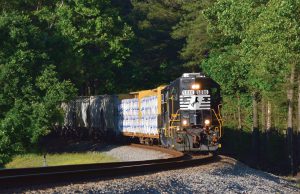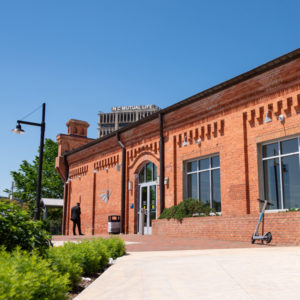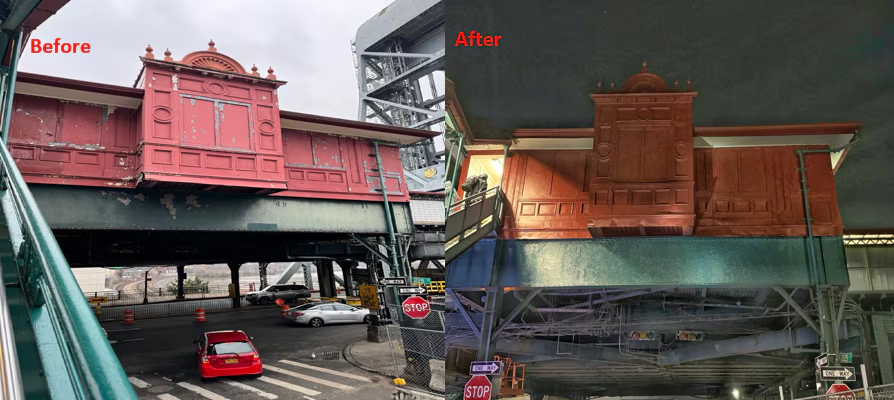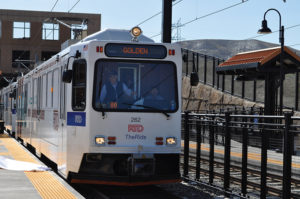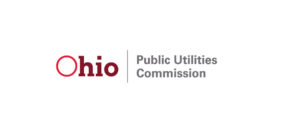Pennsylvania governor calls for more transit funding
Written by jroodFebruary 14, 2001 Beneath a 115-year-old SEPTA bridge, Pennsylvania Gov. Rendell on August 3 renewed his call for more money to fix roads and bridges, kicking off a four-day statewide tour to try to prod the General Assembly to action, the Philadelphia Inquirer reports. Rendell also sent a letter to legislators day, asking them to reconvene in Harrisburg on Aug. 23 to come up with at least $472 million more for transportation.
Rendell plans to make 20
stops in four days, seeking to create public pressure for the legislators to
act.
"I don’t have
leverage," said Rendell, whose term in office ends in January. "It’s
up to the people to create the leverage."
Senate Majority Leader
Dominic Pileggi (R., Delaware) said, "We want to accommodate the governor’s
request as best we can," but added that no agreement had been reached on
how to fund transportation needs.
"The challenge is not
so much to have [legislators] come back to Harrisburg, but to have a bill that
would get a majority of members to support it," Pileggi said. "To
date, we don’t have such a product. Once we’re at that point, we’re certainly
ready to come back to Harrisburg."
On August 3, Rendell was in
Pileggi’s legislative district, standing 100 feet below the Crum Creek railroad
bridge in Delaware County. He cited it as an example of worn-out bridges that
need to be replaced. He later stopped along a rough patch of Street Road in
Trevose, Bucks County, to highlight the 7,000 miles of Pennsylvania roads in
"poor" condition.
Rendell said the
legislature needed to raise money with new or higher taxes, and he called on
lawmakers to find the "guts and courage to do the right thing."
Rendell, a Democrat, also took a thinly veiled jab at the Republican candidate,
Attorney General Tom Corbett, who has vowed not to raise taxes if chosen to
replace Rendell as governor.
"If he were elected –
and he’s ahead in the polls – that would mean no increased funding for
transportation for four years," Rendell said.
Rendell suggested creating
an "excess profits tax" on oil companies to pay for the state’s
additional transit and highway needs. He said the seven major oil companies pay
only about $70 million in taxes to Pennsylvania.
Rendell also said a
3.5-cent increase in the state’s gasoline tax would raise $240 million, while
boosting vehicle fees – to match inflation since they were last raised 13 years
ago – would produce $327 million.
Pennsylvania’s gas tax of
32.3 cents a gallon (including the franchise tax) is 13th-highest in the nation.
The national average is 29.3 cents.
Rendell made similar
suggestions in May, when he called the legislature into special session to
tackle the state’s transportation-funding crisis. The legislature, particularly
the Republican-controlled Senate, has not shared Rendell’s sense of urgency to
raise taxes, especially in an election year.
The $472-million shortage
in the state’s transportation budget was created by a federal rejection of a
state plan to place tolls on I-80.
Rendell has been pushing
for the legislature to be much more ambitious and raise about $3.5 billion a
year for transportation. The funds would be used to reduce a backlog of 5,600
structurally deficient bridges and 7,000 miles of roads in poor condition, in
addition to allowing transit agencies such as SEPTA to buy buses, install
automated fare-collection systems, upgrade run-down passenger stations, and
replace power substations.
In his letter to lawmakers,
Rendell acknowledged the hearings held by both chambers on transportation
funding and said, "It is now time to take what we have learned from these
discussions and advance legislation which will provide for sustainable funding
for our infrastructure. We simply cannot wait."
Pileggi said he wanted to
come up with more than the $472 million to replace the lost funding from I-80
tolls, and he said tolls on other roads should be considered.
Flanked by SEPTA officials
and transit advocates, Rendell held a news conference beneath the Crum Creek
bridge, which SEPTA says would cost about $57 million to replace – if it had
the money. The bridge on the Media/Elwyn Line carries 300 trains and 10,000
passengers a day. Without the money to replace it, SEPTA officials said, the
bridge could eventually be closed to train traffic, as it was in 1982 and 1983
for repairs that were supposed to extend the bridge’s life for 25 years. That
extended life expectancy has passed, said SEPTA chief engineer Jeff Knueppel.
SEPTA has deferred dozens
of projects because of the loss of expected state funds. It has cut its capital
budget for the current year by $110 million, 25 percent.
In May, a state
Transportation Advisory Committee issued an examination of the state’s needs:
About 22 percent of the state’s 25,000 bridges are structurally deficient. The
report said additional funding of $3.5 billion, including local funding, would
allow the state to rebuild 500 bridges a year for the next 10 years. It would
also permit transit systems to add bus routes and commuter rail service, and
limit fare hikes.

